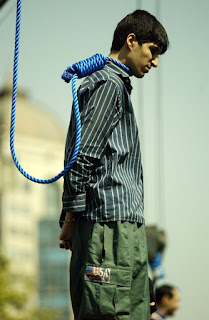GALILEO FACES THE INQUISITION
There is an essential tension between the discomforts of thought and the comforts of certainty. The comfortably certain sense that the glue holding their world together is soluble when immersed in inquiry. So, they seek to eliminate that threat by stifling inquiry and muzzling, even murdering, whomever, or whatever, promotes thought. After all, thinking can promote discomfort, even anguish, and we can't have that!
Here's one historic example: In 1615 “His Holiness and the Most Eminent Lords, Cardinals of this Supreme and Universal Inquisition” declared that Galileo has “rendered (himself) vehemently suspected by this Holy Office of heresy.” We command him “to abjure, curse and detest the said error and heresies in our presence.”
Galileo's 'crimes' were:
1. “Making the proposition that the sun is in the center of the world and immovable from its place is absurd, philosophically false, and formally heretical; because it is expressly contrary to Holy Scriptures.”
2. “Making the proposition that the earth is not the center of the world, nor immovable, but that it moves, and also with a diurnal action, is also absurd, philosophically false, and, theologically considered, at least erroneous of faith.”
Wielding the authority of their offices, the Pope and the Lords of the Inquisition determined that when Galileo abandoned the scriptures and heeded his own observations he strayed from holy truth into damnable error, from virtue into vice, and from morality into immorality. Hence the Holy Inquisition ruled, without fear of error, that Galileo’s thought and resultant findings were “unlawful” as well as “disordered and immoderate.”
Of course Galileo's findings were neither "disordered" nor "immoderate." He was 100% right when he "abandoned the scriptures and heeded his own observation." But it took the Roman Catholic Church 359 years to admit that and apologize. That's a while.
This is no isolated instance. History is crammed with example after example of established authority declaring that the results of thought and scientific evidence were “disordered and immoderate. It sparked an inquisition whenever deviance from the norm discomforted them and threatened their interests.
Consider a few of the many vital medical discoveries that were initially regarded as disordered and immoderate by the established authorities of the day:
• Dissecting and studying the structures and functions of the human body
• Inoculation
• Vaccination
• The germ theory of disease
• Anesthesia
In thousands of similar instances the prevailing authorities tried their very best to wipe out unwelcome knowledge and discomforting inquiry. In short, to wipe out anything that disturbed contemporary balance and established authority. Especially their authority.
We still have that today. Only now it includes the "woke." Hypersensitive to what they perceive as social injustice — especially racism — they employ especially blatant racism to "fight" it,) America has long contended with the likes of the Women's Christian Temperance Union, the KKK, the German-American Bund, the Communist Party USA, and other extremists. But now we have a fanatical, quasi-religious new left who enforce their dogma with the same kind of inquisitional thoroughness.
This new religion is especially common in academe where so-called "professors" now preach rather than teach. Disagree with these academic right-thinkers, disturb their self-righteousness, contradict their gospel and you are immediately branded a racist, fascist, heretic, male chauvinist pig, ad nauseam. Your arguments might be logical and your facts might be totally accurate. It doesn't matter. Challenge their gospel and an academic inquisition, composed of right-thinking 'scholars' and their administrative bedfellows will eagerly prove their ideological meddle by finding you have strayed from holy truth into damnable error, virtue into vice, morality into immorality. You are someone who must be driven from the temple, or at least denied tenure and closely watched.
George Orwell describes the dystopia that results from demands for right thinking. "A nation of warriors and fanatics, marching forward in perfect unity, all thinking the same thoughts and shouting the same slogans, perpetually working, fighting, triumphing, persecuting — three hundred million people all with the same face." But we face a divided nation of antagonistic warriors and fanatics marching toward each other each shouting oppositional slogans, perpetually working, fighting, triumphing, persecuting each other. Meanwhile the rest of us yearn only for moderation, thoughtfulness and empirical facts.
For similar considerations see www.newfoundations.com













